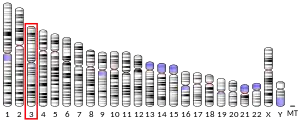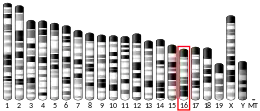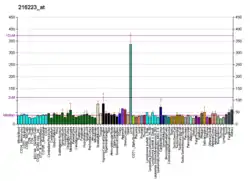| CPN2 | |||||||||||||||||||||||||||||||||||||||||||||||||||
|---|---|---|---|---|---|---|---|---|---|---|---|---|---|---|---|---|---|---|---|---|---|---|---|---|---|---|---|---|---|---|---|---|---|---|---|---|---|---|---|---|---|---|---|---|---|---|---|---|---|---|---|
| Identifiers | |||||||||||||||||||||||||||||||||||||||||||||||||||
| Aliases | CPN2, ACBP, carboxypeptidase N subunit 2 | ||||||||||||||||||||||||||||||||||||||||||||||||||
| External IDs | OMIM: 603104 MGI: 1919006 HomoloGene: 19487 GeneCards: CPN2 | ||||||||||||||||||||||||||||||||||||||||||||||||||
| |||||||||||||||||||||||||||||||||||||||||||||||||||
| |||||||||||||||||||||||||||||||||||||||||||||||||||
| |||||||||||||||||||||||||||||||||||||||||||||||||||
| |||||||||||||||||||||||||||||||||||||||||||||||||||
| |||||||||||||||||||||||||||||||||||||||||||||||||||
| Wikidata | |||||||||||||||||||||||||||||||||||||||||||||||||||
| |||||||||||||||||||||||||||||||||||||||||||||||||||
Carboxypeptidase N subunit 2 is an enzyme that in humans is encoded by the CPN2 gene.[5][6][7]
References
- 1 2 3 GRCh38: Ensembl release 89: ENSG00000178772 - Ensembl, May 2017
- 1 2 3 GRCm38: Ensembl release 89: ENSMUSG00000023176 - Ensembl, May 2017
- ↑ "Human PubMed Reference:". National Center for Biotechnology Information, U.S. National Library of Medicine.
- ↑ "Mouse PubMed Reference:". National Center for Biotechnology Information, U.S. National Library of Medicine.
- ↑ Tan F, Weerasinghe DK, Skidgel RA, Tamei H, Kaul RK, Roninson IB, Schilling JW, Erdos EG (Feb 1990). "The deduced protein sequence of the human carboxypeptidase N high molecular weight subunit reveals the presence of leucine-rich tandem repeats". J Biol Chem. 265 (1): 13–9. doi:10.1016/S0021-9258(19)40187-7. PMID 2378615.
- ↑ Riley DA, Tan F, Miletich DJ, Skidgel RA (Apr 1999). "Chromosomal localization of the genes for human carboxypeptidase D (CPD) and the active 50-kilodalton subunit of human carboxypeptidase N (CPN1)". Genomics. 50 (1): 105–8. doi:10.1006/geno.1998.5295. PMID 9628828.
- ↑ "Entrez Gene: CPN2 carboxypeptidase N, polypeptide 2".
External links
- Human CPN2 genome location and CPN2 gene details page in the UCSC Genome Browser.
Further reading
- Liu T, Qian WJ, Gritsenko MA, et al. (2006). "Human plasma N-glycoproteome analysis by immunoaffinity subtraction, hydrazide chemistry, and mass spectrometry". J. Proteome Res. 4 (6): 2070–80. doi:10.1021/pr0502065. PMC 1850943. PMID 16335952.
- Gerhard DS, Wagner L, Feingold EA, et al. (2004). "The status, quality, and expansion of the NIH full-length cDNA project: the Mammalian Gene Collection (MGC)". Genome Res. 14 (10B): 2121–7. doi:10.1101/gr.2596504. PMC 528928. PMID 15489334.
- Bunkenborg J, Pilch BJ, Podtelejnikov AV, Wiśniewski JR (2004). "Screening for N-glycosylated proteins by liquid chromatography mass spectrometry". Proteomics. 4 (2): 454–65. doi:10.1002/pmic.200300556. PMID 14760718. S2CID 29261009.
- Strausberg RL, Feingold EA, Grouse LH, et al. (2003). "Generation and initial analysis of more than 15,000 full-length human and mouse cDNA sequences". Proc. Natl. Acad. Sci. U.S.A. 99 (26): 16899–903. Bibcode:2002PNAS...9916899M. doi:10.1073/pnas.242603899. PMC 139241. PMID 12477932.
- Skidgel RA, Bennett CD, Schilling JW, et al. (1988). "Amino acid sequence of the N-terminus and selected tryptic peptides of the active subunit of human plasma carboxypeptidase N: comparison with other carboxypeptidases". Biochem. Biophys. Res. Commun. 154 (3): 1323–9. doi:10.1016/0006-291X(88)90284-7. PMID 3408501.
This article is issued from Wikipedia. The text is licensed under Creative Commons - Attribution - Sharealike. Additional terms may apply for the media files.




